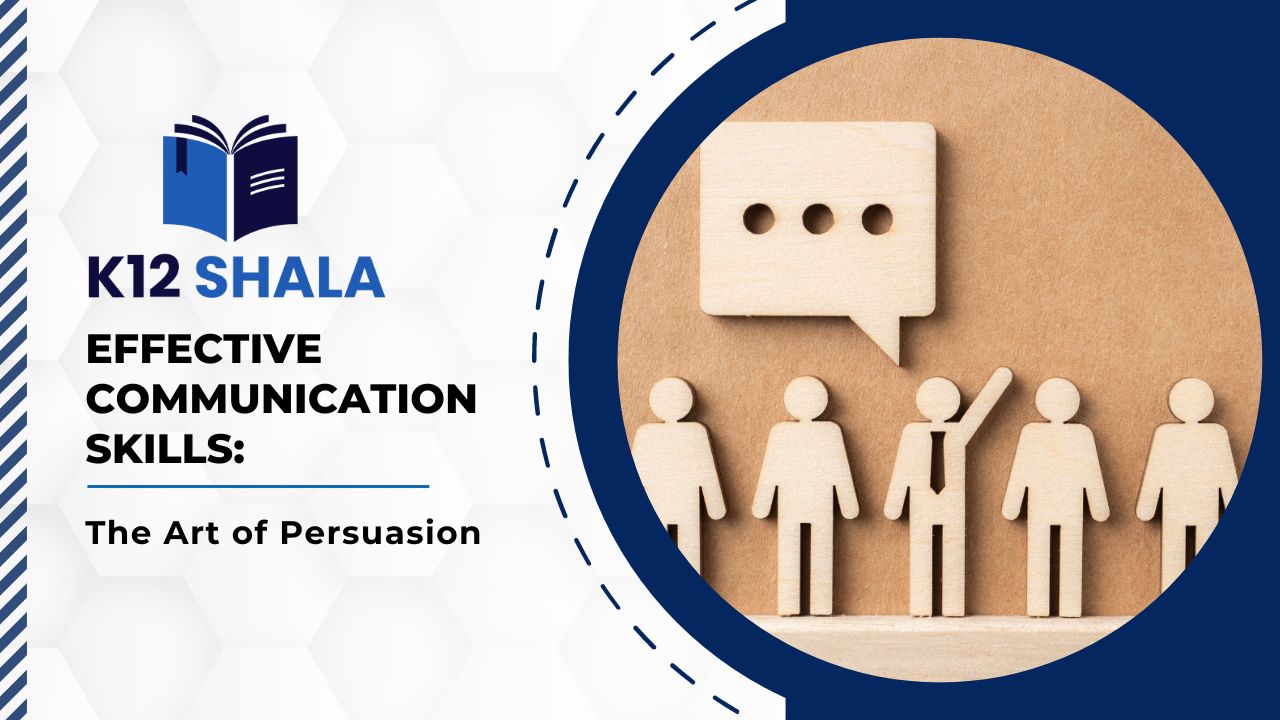Introduction
Welcome to our blog post on Effective Communication Skills: The Art of Persuasion! Whether you’re a business professional, an aspiring salesperson, or simply someone looking to enhance your personal relationships, mastering the art of persuasion is a crucial skill. In today’s fast-paced world where information overload is the norm, being able to effectively communicate and persuade others can open doors and pave the way for success in every aspect of life.
In this article, we will explore why effective communication skills are so important and delve into the different types of persuasion techniques used in various scenarios. We’ll also dive into the psychology behind persuasion and provide practical tips on how you can improve your own persuasive abilities. So sit back, grab a cup of coffee (or tea), and get ready to unlock the secrets of becoming an influential communicator!
The Importance of Effective Communication Skills
Effective communication skills play a vital role in our personal and professional lives. Whether we are interacting with friends, family, colleagues, or clients, the ability to convey our thoughts and ideas clearly is essential for building strong relationships and achieving success.
In today’s fast-paced world, effective communication has become even more crucial. With the rise of technology and social media platforms, it’s easy for messages to be misinterpreted or lost in translation. That’s why honing your communication skills is so important.
One aspect of effective communication is active listening. This involves not only hearing what someone is saying but also understanding their perspective and responding appropriately. By actively listening, you can avoid misunderstandings and ensure that your message is received accurately.
Another key component of effective communication is non-verbal cues. Studies have shown that body language plays a significant role in how we communicate with others. By being aware of your body language – such as maintaining eye contact, using appropriate gestures, and having an open posture – you can enhance your ability to connect with others on a deeper level.
Furthermore, effective communicators are skilled at adapting their message to suit their audience. They understand that different people have different needs and preferences when it comes to receiving information. By tailoring your approach based on who you’re speaking to – whether they prefer facts and figures or more emotional appeals – you can increase the likelihood of getting your point across successfully.
Clarity and conciseness are crucial elements of effective communication skills. Being able to express yourself clearly ensures that there is no room for confusion or misunderstanding among listeners or readers. Using concise language helps keep messages succinct while still conveying all necessary information effectively.
In conclusion,
Effective communication skills are invaluable in both personal relationships and professional endeavors alike.
By actively listening, being mindful of non-verbal cues, adapting messages according to one’s audience, and communicating with clarity and conciseness, we can master the art of persuasion and achieve greater success in our interactions. So, let’s invest
The Different Types of Persuasion
The Different Types of Persuasion
Persuasion is a powerful tool that can be utilized in various ways to influence others and achieve desired outcomes. Understanding the different types of persuasion can help you become a more effective communicator and achieve greater success in your personal and professional endeavors.
One type of persuasion is known as logical or rational persuasion. This involves presenting facts, evidence, and logical arguments to convince someone to see things from your perspective. By providing solid reasoning and supporting data, you can appeal to an individual’s intellect and logic.
Another type of persuasion is emotional persuasion. This approach taps into people’s emotions by appealing to their feelings, values, or desires. By connecting with someone on an emotional level, you can evoke strong responses that may sway their opinion or decision-making process.
Social proof is yet another method of persuasion often used in marketing and advertising. It relies on the idea that people are more likely to follow the actions or recommendations of others if they believe those individuals are similar to themselves or hold authority in a specific domain.
In contrast, coercive persuasion involves using threats, intimidation, or manipulation tactics to force someone into compliance. While this approach may yield short-term results, it often damages relationships and erodes trust over time.
There is persuasive storytelling – a technique where narratives are crafted around a particular message or idea intended to captivate an audience’s attention while conveying information persuasively.
By understanding these different types of persuasion techniques and how they work together – through logic, emotionality , social proofing etc.- ,you can enhance your ability to communicate effectively with others, present compelling arguments, and ultimately influence positive change.
Incorporating these strategies into your everyday interactions will enable you not only get what you need, but also build stronger connections with those around you
The psychology behind persuasion
The psychology behind persuasion is fascinating. It delves into the intricate workings of the human mind and explores how our thoughts, beliefs, and emotions can be influenced to sway our decisions. Understanding these psychological principles can give us valuable insights on how to effectively persuade others.
One key element in the psychology of persuasion is the concept of cognitive biases. These are mental shortcuts that our brains take when processing information, often leading to irrational decision-making. By tapping into these biases, we can shape our messages in a way that resonates with people on a subconscious level.
Another important aspect is social proof. Humans have a tendency to look towards others for guidance on what actions or choices to make. This principle explains why testimonials, endorsements, and reviews are so powerful in persuading individuals.
Additionally, reciprocity plays a significant role in persuasion. When someone does something nice for us or provides us with value, we feel obligated to reciprocate their kindness or favor. Utilizing this principle by offering something beneficial before making your request can increase your chances of success.
Furthermore, understanding the power of emotional appeals is crucial in persuasive communication. Emotions drive much of our decision-making process; therefore, appealing to people’s emotions can greatly influence their behavior.
By delving into the psychology behind persuasion and utilizing these principles effectively – such as cognitive biases, social proof, reciprocity and emotional appeals – you can significantly enhance your ability to persuade others successfully without resorting to manipulation tactics or coercion techniques.
How to improve your persuasion skills
How to Improve Your Persuasion Skills
1. Understand your audience: One of the key aspects of effective persuasion is knowing who you are trying to persuade. Take the time to research and understand your audience’s needs, interests, and values. This will allow you to tailor your message in a way that resonates with them.
2. Hone your listening skills: Effective communication involves more than just speaking; it also requires active listening. Listening attentively not only shows respect for the other person but also allows you to better understand their perspective, enabling you to address their concerns and objections effectively.
3. Choose your words wisely: The language you use can have a significant impact on how persuasive you are. Opt for clear, concise, and compelling language that appeals to logic as well as emotions.
4. Use storytelling techniques: Storytelling is an incredibly powerful tool when it comes to persuasion. Craft narratives that illustrate the benefits or solutions you are offering in a way that engages and captivates your audience.
5. Build credibility: People are more likely to be persuaded by someone they trust and perceive as credible. Establishing yourself as an authority in your field through expertise, credentials, or testimonials can significantly enhance your persuasive abilities.
6. Seek feedback: Actively seek feedback from others regarding how persuasive or convincing they find your arguments or proposals. Constructive criticism can help identify areas for improvement and refine your approach over time.
Remember, improving persuasion skills takes practice and ongoing effort! Keep refining these strategies while always remaining authentic in communicating with others.
Conclusion
Effective communication skills are crucial in any aspect of life. Whether you’re trying to persuade someone to buy a product, convince your boss to give you a raise, or simply communicate your ideas effectively in a team setting, mastering the art of persuasion can make all the difference.
Throughout this article, we have explored the importance of effective communication skills and how they contribute to successful persuasion. We discussed the different types of persuasion and delved into the psychology behind it.
Furthermore, we provided practical tips on how to improve your persuasion skills. From understanding your audience and their needs to using storytelling techniques and employing active listening, these strategies can help you become a more persuasive communicator.
Remember that effective communication is not just about speaking; it also involves active listening and empathy. By truly understanding others’ perspectives and adapting our approach accordingly, we can build stronger connections and increase our chances of achieving our desired outcomes.
So keep practicing and honing your communication skills. Be aware of body language cues, choose words carefully, tailor your message for maximum impact – all while maintaining authenticity. With time and effort invested in improving these essential skills, you will undoubtedly become an influential communicator who knows how to get results.
Now go out there armed with this knowledge! Put it into practice whenever possible – be it at work or in personal interactions – because effective communication is key to success in every facet of life.










